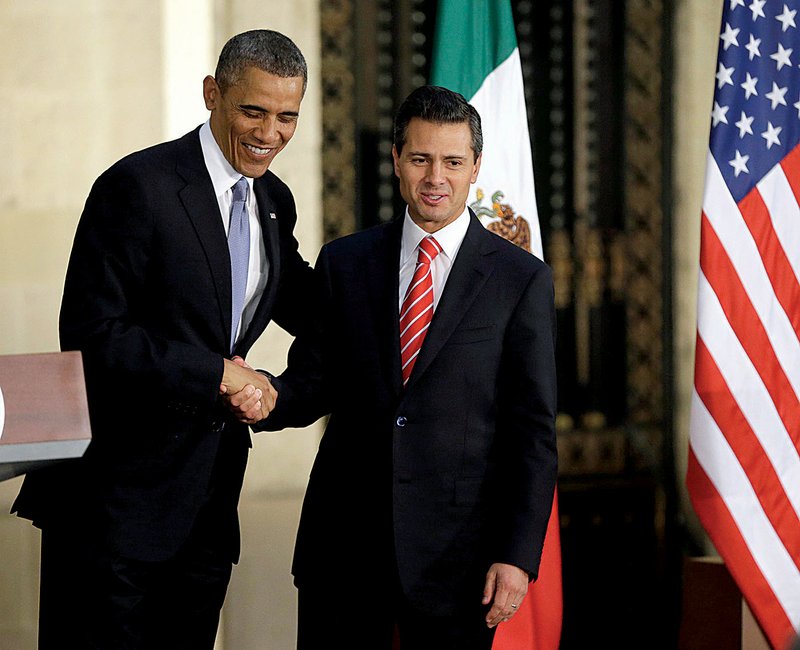WASHINGTON - President Barack Obama said Thursday that the U.S. will cooperate with Mexico in fighting drug-trafficking and organized crime in any way Mexico’s government deems appropriate. Mexican President Enrique Pena Nieto emphasized that the security relationship must be expanded to focus on trade and commerce.
Appearing alongside Pena Nieto at a news conference, Obama recommitted the U.S. to fighting the demand for illegal drugs in Mexico and the flow of illegal guns across the border to Mexico, even as the southern neighbor rethinks how much access it gives to American security agencies.
“I agreed to continue our close cooperation on security, even as the nature of that cooperation will evolve,” Obama said. “It is obviously up to the Mexican people to determine their security structures and how it engages with other nations - including the United States.”
Obama’s remarks come as Pena Nieto, in a shift from his predecessor, has moved to end the widespread access that U.S. security agencies have had in Mexico to help fight drug-trafficking and organized crime. The White House has been cautious in its public response to the changes, with the president and his advisers saying they need to hear directly from the Mexican leader before making a judgment.
Pena Nieto, speaking at the news conference in Spanish, said his government’s new security strategy emphasizes reducing violence. But he downplayed the notion that it would mean a diminished effort to fight organized crime. “There is no clash between these two goals,” he said.
Obama also said he’s optimistic that Congress will pass a new immigration law this year. That debate shouldn’t “bog down” over demands by some Republican lawmakers that the U.S. verify the security of its border with Mexico before moving ahead with measures to provide a path to citizenship for those now in the country illegally.
The two leaders met Thursday on the first day of Obama’s three-day trip to Mexico and Costa Rica, his first visit to Latin America since winning re-election. Obama was met at the steps of his plane by an honor guard and a bugler before heading to the National Palace for his meetings with the Mexican leader.
Seeking to put a new spin on a long-standing partnership, Obama is promoting jobs and trade - not drug wars or border security - as the driving force behind the U.S.-Mexico relationship.
However, the economic ties between the U.S. and Latin America that Obama is seeking to promote have been overshadowed by security issues. A violent drug war in Mexico has claimed more than 60,000 lives over the past six years.
That has played into the immigration debate in the U.S., where many Republican lawmakers have made hardening the U.S.- Mexico border a condition for agreeing to measures to give illegal aliens a path to citizenship and creating a guest-worker program.
“Mexico is the dominant foreign producer of heroin, marijuana, and methamphetamines for the U.S. market,” according to a threat assessment submitted to Congress on March 13 by James Clapper, director of national intelligence.
Mexican officials have ended the broad access the country has long given to U.S. security agencies to help combat drug trafficking. Instead, programs to fight drug cartels and organized crime will be run through Mexico’s Interior Ministry.
“What this new coordination seeks is to have more impact in less time and to emphasize an area that hadn’t been emphasized in the fight against organized crime over the past months and years, which is the area of prevention,” Sergio Alcocer, Mexico’s deputy foreign minister for North American affairs, said in a telephone interview before Obama arrived.
Since taking office in December, Pena Nieto has been working to change the country’s image from the home of a violent drug war to a center of growing industry.
Obama’s main message on his trip is the economic benefits from cross-border immigration and trade.
Obama said it will help the economies of both countries to not be constantly bogged down by border issues. And, he says if immigration is going to get done, now is the time to do it.
In his discussions with Latin American leaders over the next two days, Obama also is addressing an audience back home, where Congress next week resumes negotiating possible changes to immigration law.
The domestic debate is intertwined with the thorniest issues in U.S. relations with Latin America, including border security, drug trafficking and free trade.
After Canada, Mexico is the biggest buyer of U.S. goods sold abroad, with $216 billion in purchases last year, according to data compiled by the U.S. Department of Commerce. The U.S., in turn, bought about $278 billion, or 80 percent, of Mexico’s exports, led by oil, cars, automobile parts and flat-screen televisions.
Mexico’s economic expansion has been changing the dynamics of the immigration issue. The Mexican economy has grown at about twice the pace of the U.S.’s since the end of 2009, lessening the lure of the U.S. for Mexican workers. Net Mexican migration dropped to zero from 2005-10, according to a Pew Research Center study released a year ago.
Mexico is part of talks with the U.S. and nine other nations on creating a Trans-Pacific Partnership trade accord and is seeking to join the U.S. in talks on a free-trade agreement with the European Union.
“We believe there’s significant potential to increase and deepen our economic ties,” Ben Rhodes, Obama’s deputy national security adviser, said at a briefing Wednesday. “The two leaders will really be lifting up the economic portion of the relationship in their discussions.”
Meanwhile, Florida Republican U.S. Sen. Marco Rubio said a new immigration bill that he helped write needs stronger border security provisions or it will fail in the House and may even have trouble getting through the Senate.
Rubio, who is the chief emissary to conservatives on the contentious legislation, said he’s been hearing concerns in recent days that more work is needed to boost the bill’s language on the border, and he said he’s committed to trying to make those changes.
Rubio didn’t give specifics in an interview this week on The Sean Hannity Show radio program. But a number of conservatives have complained about “triggers” in the bill that aim to make new citizenship provisions contingent on border security accomplishments. Critics say those provisions are too weak, because in some cases the Homeland Security secretary has the task of undertaking studies - but not with delivering results - before millions of people in the U.S. illegally can obtain legal status.
Some would also like to see more requirements for building additional fencing along the border with Mexico.
“Clearly what we have in there now is not good enough for too many people, and so we’ve got to make it better. And that’s what I’m asking for and that’s what we’re working on,” Rubio said.
“This bill will not pass the House and, quite frankly, I think, may struggle to pass the Senate if it doesn’t deal with that issue, so we’ve got some work to do on that front,” he said.
Rubio’s comments came during Congress’ one-week recess. Back home, lawmakers are hearing feedback about the 844-page bill. Rubio and seven Democratic and Republican senators - the so-called Gang of Eight - introduced the legislation April 17. The Senate Judiciary Committee is expected to begin voting on it next week. Information for this article was contributed by Lisa Lerer, Nacha Cattan and Mike Dorning of Bloomberg News; and by Julie Pace and Erica Werner of The Associated Press.
Front Section, Pages 8 on 05/03/2013


